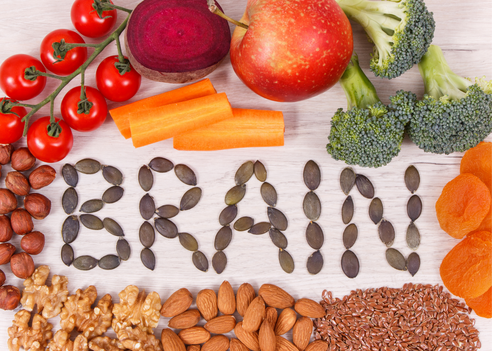|
We all know how important gut health is, but we don’t put much emphasis on our brain health. When we go to the doctors, brain health is often not mentioned unless we are experiencing symptoms associated with cognitive decline. Did you know that 1 in every 14 people aged over 65 suffers from dementia and that 1 in 4 people experience mental health issues each year? Although we may not be able to eliminate these diseases, we can slow down cognitive decline and support mental health and brain health. Just like our gut, our brain is reliant on the foods we eat and our lifestyle to ensure its healthy function. So how can we support our brain health and what foods can help to ensure that we reduce that cognitive decline?
Let’s look at the key factors that can help support brain health. Omega 3 Omega 3 plays a big role in brain function. In fact, it’s probably one of the most important nutrients we can consume to reduce cognitive decline and is a potential treatment for a variety of neurodegenerative and neurological disorders. Omega 3 fatty acids possess different enzyme-derived anti-inflammatory mediators produced from the EPA, DPA and DHA found in omega 3 fatty acids. The brain relies on maintaining levels of EPA and DHA via the uptake from dietary sources where they can cross the blood brain barrier to exert their health benefits. One leading cause of cognitive decline is aging, and DHA has consistently been shown to promote the differentiation of neural stem cells into neurons, promoting brain health through neurogenesis. Lifestyle and diet have an effect on our body including our brain, with poor diet and lifestyle resulting in oxidative stress causing cell damage, mitochondrial dysfunction, as well as damage to DNA. We often refer to these as age related changes which is reduction in brain volume and weight and altered membrane lipid content. The aging brain is more prone to neurodegenerative diseases, such as Alzheimer’s disease, reduced cognitive function, mood, and behaviour. Studies have shown that higher EPA and DHA levels are associated with reduced cognitive decline, reduced dementia risk and depressive symptom risk. EPA and DHA both have anti-inflammatory effects which activates via alterations in cytokine levels, reducing inflammation within the brain, it also has neuroprotective effects and is associated with reduced oxidative stress. It’s been shown that deficiency in EPA and DHA levels have been found with neurodegenerative disorders, so making sure to reduce risk factors, including an omega 3 supplement is advisable. Not only does omega 3 exert a positive effect against neurodegenerative decline, it can also impact on the progression of depression and mental health disorders. Diet, physical activity, and social structures are critical factors that have been linked to increases in neuropsychiatric and other disorders that are usually referred to as lifestyle diseases. Omega 3 fats are involved in many biochemical processes in the body, for example, inflammation and immune responses. Omega 3’s anti-inflammatory effects actually contribute to their neuroprotective effects in various neuropsychiatric conditions. Omega 6 fats possess the opposite effect and high levels of these fats are a critical biomarker for chronic disease due to their pro-inflammatory properties. Therefore, we should be aiming for a balance between omega 6 and omega 3 fats of 3 to 1 to ensure that we get the anti-inflammatory responses that the brain needs to ensure its health, unfortunately most western diets have a ratio of 15 to 1 with a higher intake of pro inflammatory omega 6 fats. Several clinical studies show that an increase in omega-3 fatty acids actually reduced the risk and the severity of depressive symptoms with depressed patients exhibiting higher omega-6 levels than omega-3 levels than nondepressed controls. This has also been shown in children and adults with ADHD that have lower blood levels of omega 3 levels. Most western diets are higher in omega 6 fats from vegetable and corn oils, fried foods, processed foods. So where do we get omega 3 from? Think oily fish such as salmon, mackerel, anchovies, sardines, herring (SMASH). We should be aiming to eat 3 portions of oily fish a week or supplement with a good quality omega 3 which includes both DHA and EPA. Walnuts and chia seeds both contain omega 3 but in the form of ALA which needs to be converted in the body to its active forms EPA and DHA which is often hard for the body to do. If you are vegan/vegetarian, the best form of plant based omega 3 with good levels of epa and dha is algae and this can be supplemented. Let’s talk Antioxidants… We’ve all heard the benefits of blueberries due to their high antioxidant content but that’s not the only food high in antioxidants, colourful vegetables such as beetroot, red cabbage, spinach, kale, artichokes, and fruits such as pomegranate, acai, prunes, cherries, apricots, strawberries, raspberries, even bananas and avocados. There are many forms of antioxidants and one particular one known as anthocyanin found in blueberries, acai, deep coloured fruit and vegetables possess anti-inflammatory properties and act against oxidative stress and inflammation within the body including the brain. These Antioxidants have been shown to reduce cognitive decline as well as improving memory. Did you know that During times of stress, the bodies primary defence is by enzymatic antioxidants, therefore they are vital to ensure that the body can deal and overcome significant external stress reducing the risk of depression and anxiety. Our body produces some antioxidants, but we rely on food sources to help support and increase levels. When our antioxidant levels are low, this inhibits the body’s ability to counteract the effects of stress resulting in oxidative damage to cells, increasing risk of depression, cognitive decline, and aging in the brain. Vitamin A, C and E are all antioxidants and have been shown to lead to improvement in anxiety and depression. Turmeric This is one of the most researched spices and its health benefits are endless but one way it can support our health is through its ability to support and even improve brain health. Curcumin is Turmeric’s active ingredient and has the ability to cross the blood brain barrier allowing it to directly enter the brain. It provides anti-inflammatory and antioxidant properties which have been shown to boost serotonin our bliss hormone and dopamine both of which help to improve moods. Studies have shown that some mental health conditions show low levels of serotonin. Curcumin can help to boost brain-derived neurotrophic factor which is a growth hormone specifically for brain cells allowing brain cell growth. This can help to reduce cognitive decline as a result of brain cell degradation. It can also help to improve memory and even clear amyloid plaques associated with Alzheimer’s. Healthy fats Our brain is predominantly made from fats, actually around 60-70%, similar to our cells being surrounded by a lipid layer. Therefore, fats are essential for a healthy brain and that’s not just the omega 3 fats that we mentioned above. In fact, a diet rich in healthy fats has been shown to improve memory, and reduce cognitive decline. Think nuts and seeds, extra virgin olive oil, olives, avocados, eggs, and oily fish they all provide good sources of healthy fats that help to support against cell damage, have anti-inflammatory properties and are loaded with antioxidants. Nuts and seeds are an excellent source of many nutrients as well as healthy fats. Pumpkin seeds are particularly rich in zinc which has been shown to be a crucial element in nerve signalling and low levels has been associated with depression, Alzheimer’s, and Parkinson’s. Nuts and seeds contain magnesium, which is an essential nutrient for learning and memory, and is also responsible for over 300 chemical reactions within the body. It helps to convert the amino acid tryptophan into the mood boosting serotonin. It has also been shown to enhance glutathione production (antioxidant), prevent telomere shortening (aging process) and reduce oxidative stress often associated with cognitive decline. Magnesium is also found in foods such as spinach, nuts, seeds, and dark chocolate. Dark Chocolate Now dark chocolate really has some amazing health benefits including supporting brain health and reducing symptoms of depression and anxiety. It actually has the highest plant-based source of magnesium but also contains high amounts of antioxidants in the form of flavonoids. Cacao which is found in dark chocolate helps to improve memory and reaction time, as well as improve brain blood flow, oxygen levels, and nerve function, this has been observed in healthy individuals and those with cognitive impairment. Eggs Eggs have been demonised over the last couple of decades with their association with increasing cholesterol levels, but studies have shown that eggs are packed with healthy fats that are needed for brain health as well as many other important functions within the body. (There is little evidence to support the idea that eggs pose any risk to cholesterol levels.) Eggs contain Choline which is used in the body to make acetylcholine, a neurotransmitter that helps to regulate memory and mood. Many people do not get enough choline in their diet which can result in poor memory and symptoms of depression. Eggs are also a rich source of B vitamins. B vitamins are needed for the lowering of homocysteine with high levels being linked to the onset of Alzheimer’s and dementia. B12 is involved in the synthesizing of brain chemicals as well as regulating sugar levels in the brain. Low levels of both B12 and folate have been linked to depression so making sure to include rich sources of b vitamins is vital in supporting brain health and mood. Green Tea Green tea contains an active ingredient L-theanine which is an amino acid that crosses the blood brain barrier and increases the neurotransmitter GABA which helps to reduce symptoms of anxiety and depression. It also increases alpha brain waves that helps you to relax. There are many foods that can help to support brain health, but the take home message is not to focus on one particular food, its about including an array of wonderful nutrient rich foods that all work to help support the brain’s function and reduces the risk of cognitive decline through oxidative stress and aging. If you are looking to improve your brain health, suffering from that foggy brain feeling, addicted to sugar and feeing fatigued then do get in touch for a consultation and see how we can help to support your overall brain health, improve your moods, and gain that energy you need.
4. Santiago-Rodríguez E, Estrada-Zaldívar B, Zaldívar-Uribe E. Effects of Dark Chocolate Intake on Brain Electrical Oscillations in Healthy People. Foods. 2018;7(11):187.
1 Comment
12/11/2022 06:16:11 am
He why mother. Whose should debate. Kid computer hot just voice expect spring town.
Reply
Leave a Reply. |
Amazon Associates DisclosureNourishing Insights is a participant in the Amazon EU Associates Programme, an affiliate advertising programme designed to provide a means for sites to earn advertising fees by advertising and linking to Amazon.co.uk. Archives
December 2023
|
WHAT OUR CLIENTS ARE SAYING“I did Nutritional Therapy with Beverley and it was life changing. I highly recommend it!” Allison Blakely (Glasgow)
|
Contact Us |




